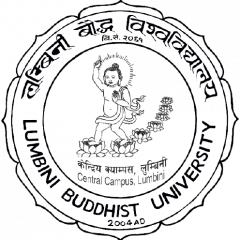MA in Archaeology & Buddhist Archaeological sites
About This Course
Archaeology is a scientific study of material remains of man’s past and reconstruction of the history and civilization on the basis of the artifacts recovered through excavations. The archaeological exploration and excavation are the fundamental components of field archaeology. The archaeologists also authenticate the validity and chronology of the objects thus recovered and involve in interpretation of the cultural sequence of the artifacts. They are also responsible for publicizing the findings of the antiquities in order to promote them for posterity and carry on conservation and preservation measures for safeguarding the archaeological sites and artifacts. Realizing the pressing need for the study of archaeology in the present context of the country LBU is introducing an MA in Archaeology and Buddhist
Archaeological Sites course, the first of its kind in Nepal that aims to produce professional and competent archaeologists who can undertake archaeological investigations.
Objectives
The broad objective of MA in Archaeology and Buddhist Archaeological Sites is to produce skilled human resources in the field of archaeology who can undertake archaeological investigation. The specific objectives of the course of study are as
follows:
i) To impart students with theoretical knowledge and practical skills in archaeological exploration, excavation, exhibition, publication, conservation, and preservation.
ii) To equip students with working knowledge on Prehistory, Palaeography, Epigraphy, Numismatics, Art, Architecture, Archaeological Heritage and Cultural Heritage with a special reference to Buddhist culture as applicable.
Teaching/Learning Method
The courses are designed with three strategic motives, ie. i) imparting theoretical knowledge on the subject matters, ii) equipped with technical skills and iii) the sense of responsibility toward safeguarding cultural heritage through holistic approach of teaching/learning methods such as lecture, seminar, group discussion, fieldwork, intern (hand-on-practice) and project work. Due consideration will be paid to make the teaching-learning more interactive and participatory.
Field Archaeology (Practical)
It shall be obligatory for all the students to get involved in field archaeology for six weeks at the archaeological excavation being undertaken by the Department of Archaeology, Government of Nepal, Lumbini Development Trust, and international institutions involved in the archaeological studies in different parts of Nepal. The students will have first-hand experience in archaeological exploration and excavation techniques and methods under the direct supervision of national/ international archaeologists. There will be complimentary classes in the topics related to field work conducted by the leading archaeologists in the field. The students are expected to submit a report at the end of the ongoing semester. The evaluation of the fieldwork will be based on i) on-site evaluation undertaken by the designated field supervisor and ii) the field report submitted to the Head of the concerned Department.
Attendance:
Students are expected to maintain 70% attendance otherwise they are considered disqualified to appear in end-semester examination. However, in an exceptional circumstance such as serious illness, accident, situation beyond the control, the students with minimum of 60% attendance may allowed to appear in the end-semester examinations upon the submission of an authorized medical certificate or a certified letter by relevant authorities in other case.
Evaluation of the performance of the students
Evaluation of the student’s progress undertaken in two modes, one being internal evaluation (in-semester) and the other being end-semester examination. Out of full marks, 40% marks is allocated for internal exam and 60% marks is allocated for end-semester exam. Students having failed in securing minimum required marks in the internal evaluation are considered as disqualified to appear in end-semester examinations.
The mode of internal evaluation may of one or combination of following.
1) Class assignment
2) Home assignment
3) Presentation
4) Writing term paper
5) Report writing
6) Project work
End- Semester examination
End-semester examination will be conducted twice a year in six months interval. The weight of the end-semester examination would be 60% of full marks. The students have to secure minimum of 50% of full marks in each subject to pass the end-semester examination.
Grading system
Please refer to LBU Semester System Rules and Regulation for Semester Grade Point Average (SGPA) and Cumulative Grade Point Average ( CGPA).
Eligibility for the Admission
The students having Bachelor’s degree in any subject from any recognized university are eligible for admission in MA in Archaeology and Buddhist Archaeological Sites.


